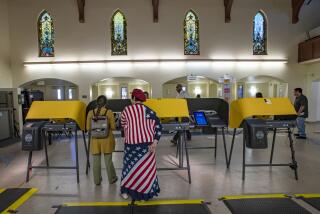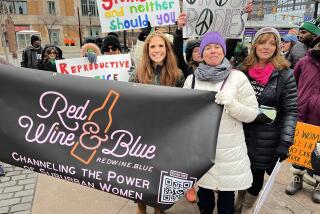Taking On the Issues Here and in Iraq
- Share via
Eileen Padberg spiced up our first lunch a dozen years ago with a withering broadside against the Orange County Republican Party hierarchy. What made it zing was that Padberg was a Republican consultant who had just worked on a female candidate’s failed effort to unseat incumbent GOP Rep. Bob Dornan in a party primary.
Over her Cobb salad that day, she said the “little men” in the power structure had made life miserable for her and the candidate. Between bites,
Padberg was letting them have it right back.
That is prologue for the Eileen Padberg I talked to Tuesday morning, back in Orange County for a short break before returning to Iraq and a job that makes no sense and perfect sense at the same time.
Padberg had been in Iraq since June, under a one-year contract with a San Diego firm to work on a program she devised to help Iraqi women get their fair share of postwar reconstruction projects.
Doing a job like that in America might be rewarding; doing it in Iraq might be historic.
“If democracy is ever going to happen in Iraq,” she says, “I’ve always thought that women having an economic stake in the country would make it happen. Getting an economic stake meant they had to have equal opportunity for jobs and contracts that our government was providing through the reconstruction process.”
Iraq has a professional women’s sector, particularly in engineering, but the post-Saddam resurgence of Islamic extremism has threatened it. Still, Padberg says she’s found a repository of women “excited about the potential of having someone provide them the opportunity for equal footing.”
That is the language of the job. As Padberg has discovered, another language streaks through daily life in Iraq -- the language of staying alive and outlasting the insurgency.
This is the time to inject that Padberg, 60, is not exactly Marine-trained. She likes Nordstrom, nice restaurants and fine clothes. Her Laguna Niguel house has 3,100 square feet.
Since June, she’s lived inside the Green Zone, which is like Balboa Island minus all the amenities. “I live in a trailer that’s not as big as my living room,” she says. “With four other women. No shopping, no restaurants, no view, no place to go. I’m not allowed to walk alone. At night, not at all, unless I’m with two security guards with two guns. It’s a surreal life. Everywhere I go outside of the trailer or outside of my office, I have to wear a bulletproof vest that weighs 41 pounds and a helmet that weighs six pounds.”
None of that is said with a “poor me” tone, even when noting there’s a $300,000 bounty on the head of any American woman. “The terrorists want to influence us to leave, and the way they can do that is by
kidnapping an American woman.”
Three weeks ago, a rocket flew by outside the trailer. “You could hear the air ‘s-s-s-s’
over us,” she says. “It was that close. I thought, ‘What the hell am I doing here?’ Then I get one letter from an Iraqi woman who says how much I’ve helped, and I say, ‘This is worth all the [grief] I’ve taken for six months.’ ”
There have been successes, she says. Fifty-four women attended a “bidding conference” in November. At another conference, two women won contracts of $550,000 and $570,000. If the United States stays the course, she says, a democracy could sprout in the next few years.
She’s getting paid (but won’t say how much), but also says she’d do it for nothing. “I needed a change, a challenge. I have worked in some fashion on behalf of women all my life. I needed to challenge myself and really felt that doing this on behalf of women seeking some sort of democracy would be the best test I ever had.”
More to Read
Sign up for Essential California
The most important California stories and recommendations in your inbox every morning.
You may occasionally receive promotional content from the Los Angeles Times.













